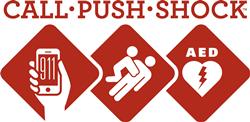
The chance of survival from sudden cardiac arrest can increase from 10 to 30 percent when bystanders provide CPR. It can be even higher—50 percent or more—when bystanders provide CPR and use AEDs before EMS arrival.
PITTSBURGH (PRWEB)
June 01, 2022
Parent Heart Watch and Sudden Cardiac Arrest Foundation, co-sponsors of the Call-Push-Shock movement—along with 50 co-partners—urge the public to learn CPR and how to use automated external defibrillators (AEDs) to help save lives threatened by sudden cardiac arrest. Their appeal comes during National CPR and AED Awareness Week, June 1-7, a national observance designated by Congress in 2007.
Call-Push-Shock is a national collaborative movement designed to drive public awareness, understanding, and action in cases of out-of-hospital cardiac arrest and increase survival rates by speaking in one voice across multiple organizations. Call-Push-Shock urges the public, when it witnesses sudden cardiac arrest, to call 911 to get help on the way, immediately provide CPR by pushing hard and fast in the center of the chest, and use an AED, if available, to restart the heart.
Sudden cardiac arrest (SCA) is the third leading cause of death in the U.S. It affects more than 356,000 people each year—including 23,000 youth under age 18—and unfortunately only one in every 10 victims survives. The survival rate has been stagnant at about 10 percent for decades in large part because the public does not understand its critical role in saving lives.
Call-Push-Shock was developed in response to a 2015 report from a workshop hosted by the Institute of Medicine (now the National Academy of Medicine). Among other things, the IOM report recommended: “crystallizing messaging to promote public awareness; using a singular, simple, concise, easy-to communicate, and compelling message; establishing a public awareness campaign; and establishing a cardiac arrest collaborative.”
Call-Push-Shock leverages results of national research studies conducted for Sudden Cardiac Arrest Foundation by strategic research boutique StrataVerve. Findings indicate most Americans are unfamiliar with sudden cardiac arrest and the critical importance of immediate bystander intervention. However, when exposed to a simple, concise explanation of SCA, both the perceived importance of learning CPR and AED skills, and the likelihood to give CPR or use an AED in an emergency jump significantly.
“Sudden cardiac arrest is a public health crisis that affects people of all ages,” said Martha Lopez-Anderson, executive director of Parent Heart Watch. “There is a critical need to raise awareness about sudden cardiac arrest, educate people about the importance of taking immediate action, and empower communities to provide CPR training and widespread access to AEDs.”
“The chance of survival from sudden cardiac arrest can increase from 10 to 30 percent when bystanders provide CPR. It can be even higher—50 percent or more—when bystanders provide CPR and use AEDs before EMS arrival,” said Mary M. Newman, MS, president of the Sudden Cardiac Arrest Foundation. “Since about 70 percent of cardiac arrests occur in the home,” chances are bystanders will be called upon to help someone they know and love.”
Parent Heart Watch and Sudden Cardiac Arrest Foundation jointly launched Call-Push-Shock in June 2018. More than 50 organizations have since joined the movement, and the Centers for Disease Control and Prevention now lists Call-Push-Shock as a public access defibrillation resource. Nonprofit and EMS agency co-partners include: Louis Acompora Memorial Foundation, Aidan’s Heart Foundation, John Taylor Babbitt Foundation, Buddy CPR, CARES, Championship Hearts Foundation, Christiansburg EMS, Citizen CPR Foundation, City of Orlando Fire Department, Every Second Counts CPR, Greater Williamsburg HEARTSafe Alliance, Heartbeat NOLA, Heart Rhythm Society, HeartStart Foundation, Illinois Heart Rescue, In A Heartbeat, Matthew Krug Foundation, Dominic A. Murray 21 Memorial Foundation, National Safety Council, Orlando Health Heart Institute, Eric Paredes Save A Life Foundation, Project ADAM, PulsePoint Foundation, Starting Hearts Foundation, SADS Foundation, SCAA-Anthony Bates Foundation, and Who We Play For. For-profit co-partners include Avive Solutions, Cardio-Partners, Defibshop USA, Defibtech LLC, Enerspect Medical Solutions, Laerdal, LifeSafety Solutions, One Beat Medical & Training, Resurgent Biomedical, SaveStation, Screening America, and ZOLL Medical Corporation.
To join the Call-Push-Shock movement, reach out to contact (at) callpushshock (dot) org.
About Parent Heart Watch
Parent Heart Watch (PHW) is the only national organization solely dedicated to protecting youth from sudden cardiac arrest and preventable sudden cardiac death. PHW leads and empowers others by educating and advocating for change. Its vision is to eliminate preventable deaths and disabilities from sudden cardiac arrest in youth by 2030. For information: contact (at) parentheartwatch (dot) org.
About Sudden Cardiac Arrest Foundation
Sudden Cardiac Arrest Foundation is a national community benefit 501(c)(3) organization dedicated to raising awareness about sudden cardiac arrest and saving lives. Our vision is to eliminate preventable death and disability from sudden cardiac arrest and support people affected by SCA. Our mission is to raise awareness of SCA and promote initiatives that help save lives through education, research, and community. For information: info (at) sca-aware (dot) org.
Share article on social media or email:

